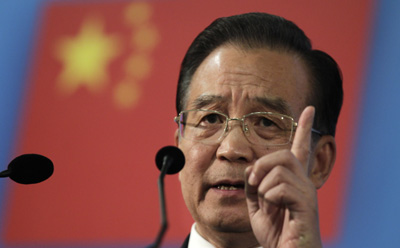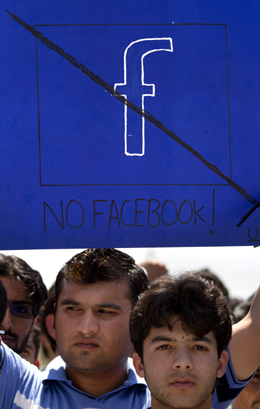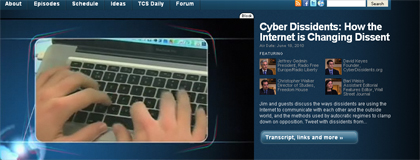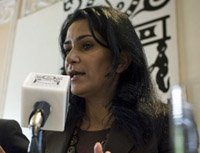Internet Blotter
Omid Memarian gives insight into the Iranian hardliner in-fighting that led to “blogfather” Hossein Derakhshan’s arrest and sentencing.Pakistan blocks Facebook, but doesn’t block militant jihadi sites.What happened when the authorities shut down the Internet in China’s Xinjiang province.”Deleted” Facebook photos can stay available for years (from the excellent Ars Technica, now banned in Iran).Quote of…

In China, more calls for media freedom
Today, members of China’s Communist Party Central Committee met in Beijing to open a three-day discussion on the country’s next five-year development plan. And while they’re unlikely to openly debate a recent letter by 23 senior Party members, which called for sweeping reforms of China’s media censorship policies, it will certainly be in the air.
Communist Party elders urge end to China’s censorship
Twenty-three senior Communist Party members have published a letter calling for sweeping reforms of China’s media censorship policies. “Our core demand is that the system of censorship be dismantled in favor of a system of legal responsibility,” the letter said, according to an English translation by Hong Kong University’s China Media Project. Widely distributed by e-mail and posted…
Internet blotter
The International Telecommunications Union starts its plenipotentiary meeting this week. Some worry that some nations will use their position at the ITU to attempt to grab more control over how the Internet works. RSF covers the Burmese DDOS attacks. I’ve heard some really fascinating detective work on the real origins of these attacks – hope…
Global Voices Advocacy: Great Firewall of China Upgrade?
Oiwan Lam reports widespread disruption for users of Freegate, the popular circumvention software in China: According to the RFA report, users from several provinces across the country have encountered similar problem and they believe that it is due to the upgrade of Great Fire Wall. Apart from the Freegate, when running UltraSurf and FreeU the…
China Media Project – Microblogs are crucial in China
Hu Yong’s writes on the rise of microblogs (like Twitter, which is blocked) on the Chinese Internet. Recently, when a newspaper reporter exposed related-party transactions by a listed company, local police authorities issued a warrant for his arrest. Tens of thousands of microblog posts were sent out about this incident. Users expressed their views and…

Global Media Forum cites risks of environmental reporting
He’s young, unemployed and carries himself with the innocence of a man who hasn’t spent much time outside his own village. But Egyptian blogger Tamer Mabrouk is the real deal. Appearing at an international media conference in Bonn, Mabrouk’s description of chemical dumping into a brackish lagoon on the northern Nile Delta near the Mediterranean Sea…

In Pakistan, a censor’s hand in Facebook, Twitter woes?
Last week, users of Facebook and Twitter in Pakistan began reporting a strange security problem. When they visited those sites, they found they were logged in–but with the accounts and privileges of complete strangers. Private Facebook information and Twitter direct messages belonging to other users were viewable, and the surprised Pakistani users had complete control…

As dissidents move online, governments fight back
Social media and cyber dissidents have exerted a increasing influence on global politics over the last few years—Twitter, for instance, was widely utilized by protesters and journalists during Iran’s 2009 post-election Green Movement, and China has been locked in conflict with Google over allegations of censorship and hacking. “Ideas in Action” with Jim Glassman, a half-hour weekly show on…

Cano laureates say no to UNESCO Obiang prize
Each year, UNESCO honors a courageous international journalist with the UNESCO/Guillermo Cano World Press Freedom Prize, named in honor of the Colombian editor murdered in 1986 by the Medellín Cartel. The prize is chosen by an independent jury and over the years I’ve attended several moving ceremonies in which some of the most daring journalists…